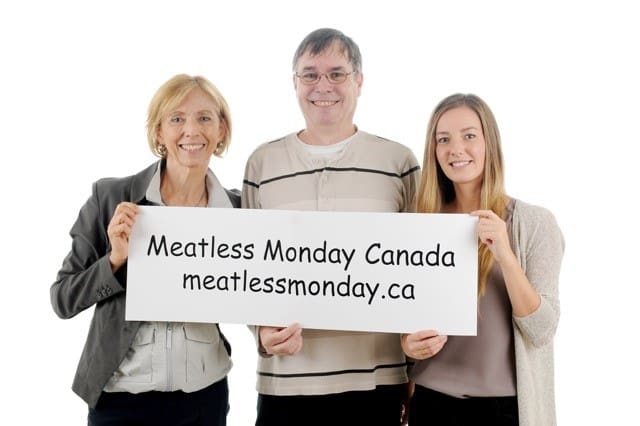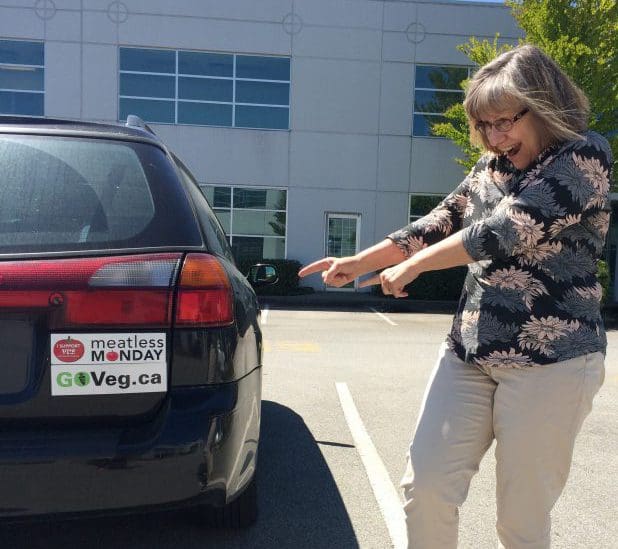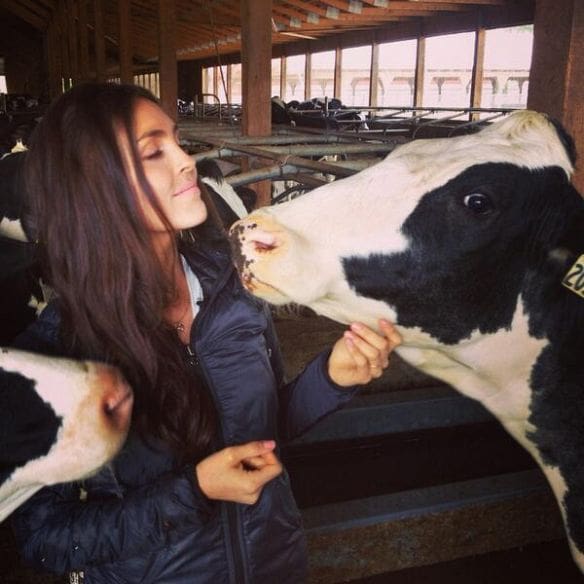
Erin Ireland is a food journalist, blogger, entrepeneur and animal-lover who has been on a personal journey to discover and understand the principles and practices involved in ethical eating. In a recent blog post (reprinted below with her kind permission) she describes her transition to a plant-based diet.
It’s Sunday morning and I’m sitting here on the couch in pyjamas drinking an almond milk latte. I’m crying after re-reading some of the 831 comments on Jillian Harris’ blog post, “How This Alberta Meatatarian Became so Vegan-ish”, in which she opens up about her transition to a plant-based diet.
In the days following her post, I texted Jillian to say how impressed I was by her written words—how I envied her ability to get thoughts ‘on paper’ so effortlessly. What she wrote would have taken me months. She has drawn me to my computer today to share the unedited story of my own journey. I usually stick to sharing my ‘plant-based messages’ on social channels because they are short and easy to write. I definitely prefer talking over writing, which is why I gave this speech. But Jillian’s post (which broke jillianharris.com website traffic records) inspired me to go deeper and share some of the factors the inspired my personal decision to go vegan.
Like Jillian, I used to be a ‘meatatarian’. I was proud of it. As a college athlete training twice a day, I was the type to order double meat at Subway. I thought eating nothing but ‘lean animal protein’ would help me achieve a healthier, more fit, muscular body. I often said that I was “just not the type who would ever become a vegetarian”.
Wow, how things have changed…
WHAT DOES “VEGAN” MEAN?
My introduction to the word vegan came when I asked my parents what the term meant. My memory is a bit fuzzy, but I believe they alluded to the fact that veganism was some super-extremist lifestyle that was more-or-less unachievable and mainly adopted by ‘extreme hippies’. I never thought twice about learning more.
Looking back, I don’t blame my parents. 25 years ago things were different. Factory farming wasn’t in the media spotlight like it is today. Baby-Boomers were raised in a time when meat and dairy was fully embraced. National meat and dairy councils were (and still are) supplying nutritional information to schools in North America. Despite the conflict of interest, teachers believed what they were teaching and young, impressionable students ate it up, literally.
THE FIRST ANIMAL PRODUCT I REMOVED FROM MY DIET
My first step towards cutting animal products out of my life came during sophomore year of university. For most of my life, I’d felt a little bit stuffed up, as if I had a constant cold. My dad suffered the same symptoms and told me that cutting milk out of his diet seemed to alleviate the stuffiness. I switched to soy milk. Immediately my sinuses felt better and I never went back to milk (note: this isn’t a professional opinion and I’m not saying this can work for you, just that it worked for me). I’ll admit, I still ate cheese and chocolate from time to time …how could I resist? I thought it was worth a bit of congestion.
The other reason I cut milk out of my life was acne. My skin issues began around the age of 19. I often got blemishes after big doses of dairy. Cutting milk out of my diet helped, but it was also a hormonal thing for me—going on the pill was the only thing that finally resolved my skin problems completely. Ironically, at the time my reasons for cutting dairy out had nothing to do with environmental or animal welfare issues. I didn’t know the truth about the lives of so many dairy cows. Today, in my heart, our planet and the animals are the main reasons I am passionate to seek dairy alternatives.
MEAT OBSESSION DURING MY VOLLEYBALL YEARS
As an NCAA Div. 1 volleyball player, I thought I needed a ton of protein. I thought I needed a meat heavy diet. Not a single girl on my volleyball team ate vegetarian—if any teammate, classmate or teacher raised the topic of vegetarianism during my four years of school, I don’t remember it. At my peak, I weighed 155 lbs and was the second strongest female in my athletic department. Always looking to take things a notch further, I wanted to gain more muscle and I thought eating meat would help. Sometimes for dinner, I’d eat a whole rotisserie chicken. Nothing else. Even worse, my teammates and I would go to the Golden Corral buffet (which my mom nicknamed, ‘the pig trough’) for all-you-can-eat steak.
My small university town in South Carolina revolved around the one Walmart, and I loved going there to buy their cheapest lean ham. Another regular purchase was extra lean ground beef that for Hamburger helper that my roommate and I used to love to make. We thought we were making healthy choices. My mom would sometimes ask if I knew where this meat was coming from. I always dismissed her questions thinking she was being a paranoid mom. I remember telling her that the FDA / governing bodies wouldn’t allow unsafe food on the shelves…was I ever wrong. My mom had been right to question.
THE DOCUMENTARIES THAT GOT ME THINKING
My transition to a plant-based diet slowly started with the documentary, ‘Forks Over Knives’. The movie presented facts that a vegan diet not only stops disease from forming in the body, but actually reverses it. The evidence was convincing to say the least. I started to realize the impact animal-based foods were having on our health. I couldn’t believe this was the first time I was hearing such important information. The more I learned, the fewer animal products I ate.
Earthlings was another documentary that had a huge impact on me. It introduced me to the term, speciesism: the prejudice or bias in favour of the interests of members of one’s own species and against those of members of other species. The documentary is graphic, filled with undercover footage shot inside factory farms and the odd slaughterhouse. I shut my eyes and cried through much of it, but I felt strongly that I needed to know what was going on behind closed doors. How could I make decisions about my food choices unless I knew the consequences of my actions? Now, I had seen those consequences and I simply couldn’t have anything to do with it. Farming is not what it was 100 years ago and the vast majority of the time, animals are not leading the happy lives, as depicted on food labels.
At this point in my life, I was still eating cage-free organic eggs from time to time, and if I was in a dining situation where the only option was seafood, I’d take it. But gradually, as I continued to read and watch, I lost all appetite for anything animal-based, including leather.
WHERE I AM TODAY
Three years into my plant-based journey, there are a couple recurring questions friends and family often ask. The first is which animal product I miss the most? The answer is: none. Since learning the true impact of animal agriculture, my cravings for animal products has completely disappeared. Anyone who knows me can vouch for the fact that I love GOOD food, and today, my plant-based options leave me dreaming about my next meal every single day.
The second question is whether my energy or training has suffered since quitting animal protein. Today, I’m more energetic and satiated than I ever was in university. I’m up at 5:30am for a 10K run about five days a week. I can’t imagine having the energy to do this back in the day — I remember always feeling hungry and tired during my school years. Another important driver for me was learning that the fear of not getting enough protein from plants…is a myth. As long as we consume our daily recommended intake of calories (from whole foods), it’s nearly guaranteed we will also get our daily recommended dose of protein. Our bodies can’t even process extra protein (just like vitamins) so they are eliminated from our systems, into the sewage system.
The last thing I’m often asked, is whether veganism requires more work. Ironically, I find it requires less (less stress too!). It’s really the little things that start to add up: no more racing home to get groceries refrigerated. No more obsessive washing of the cutting board for fear of e-coli or salmonella. No more finicky fat trimming. No more stressing over timing and temperature for the perfect steak, roast, or chicken. No more fear of meaty leftovers going bad if I forget to refrigerate right away.
Remember there’s always a learning curve when transitioning to any new diet. If the thought of vegan meal planning is daunting, know that, unlike generations before us, we are spoiled by the amount of amazing resources out there. For starters…
Before hitting publish I reread the post that inspired this note. Jillian received 831 comments on her blog and Instagram post—almost all filled with love, encouragement and acceptance. They bring tears of happiness to my face when I read them. What’s even more heartening are the actions of her following that I’m certain will be inspired from the conversation she has just begun.
Thanks to leaders like Jillian, a word I associated with ‘extreme hippies’ 25 years ago, is now well on it’s way to becoming a mainstream movement. This gives me so much hope.
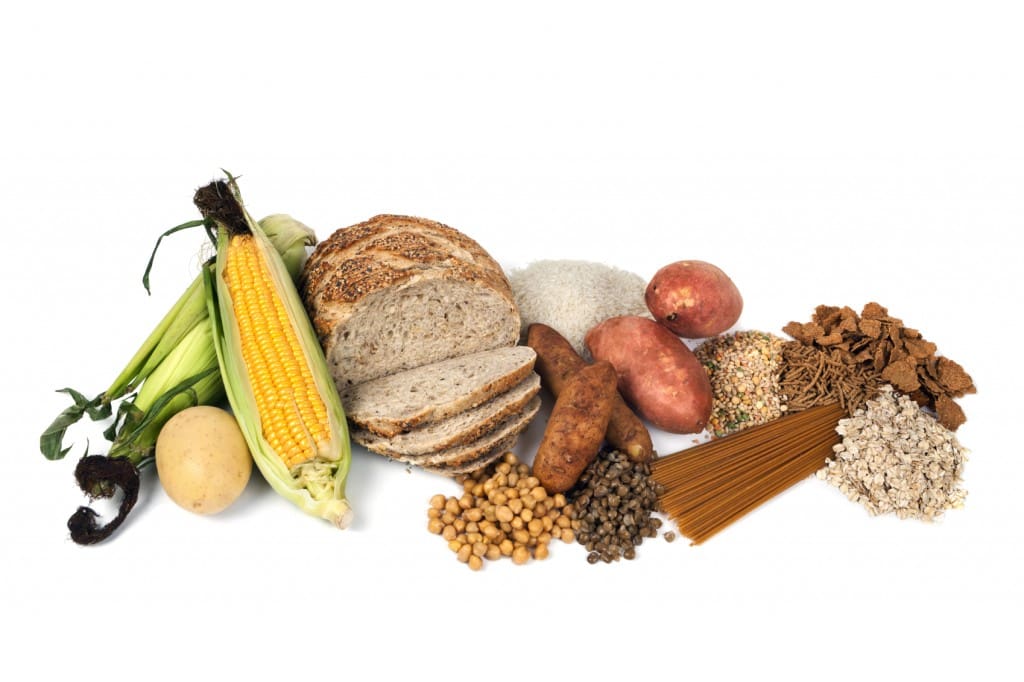

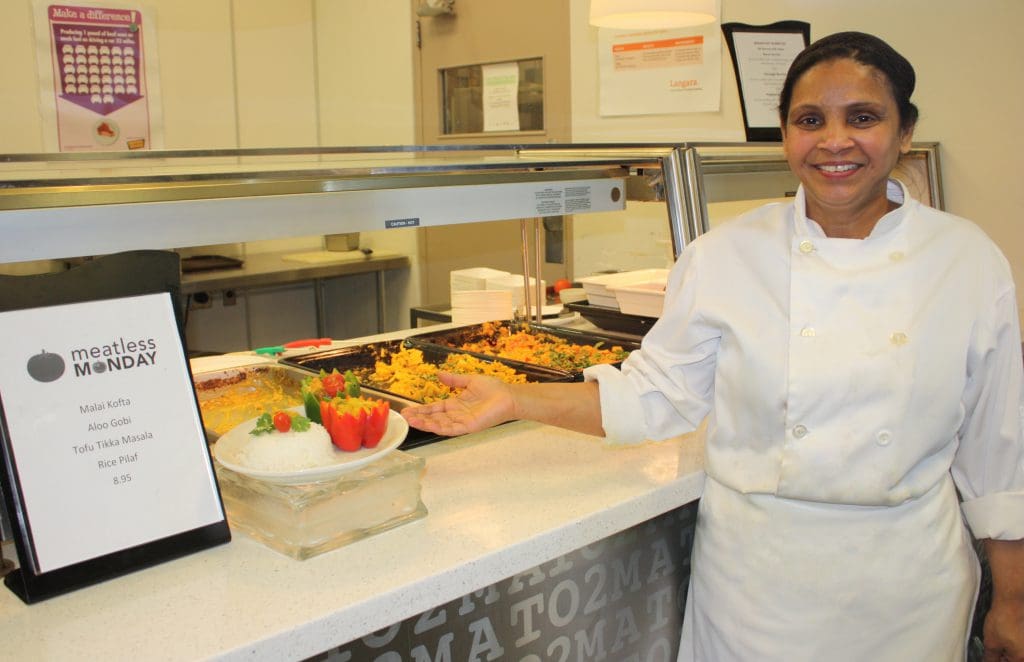
 Meatless Monday specials have been paired with eye-catching, educational posters aimed at raising awareness and boosting participation in the initiative. Statistics outlining water use and greenhouse gas emissions from
Meatless Monday specials have been paired with eye-catching, educational posters aimed at raising awareness and boosting participation in the initiative. Statistics outlining water use and greenhouse gas emissions from 
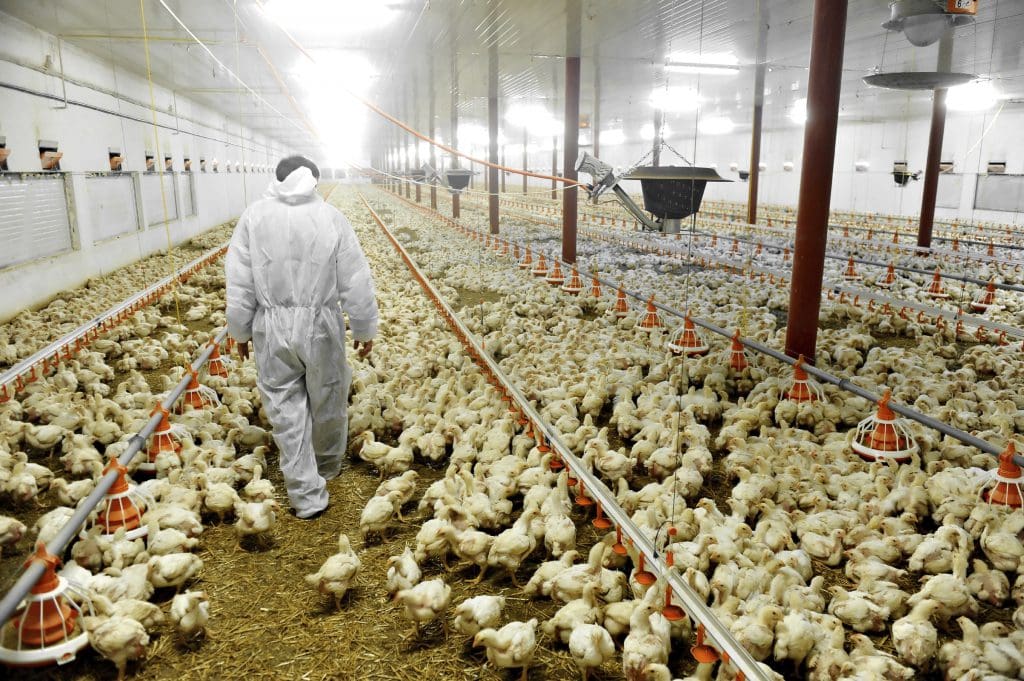
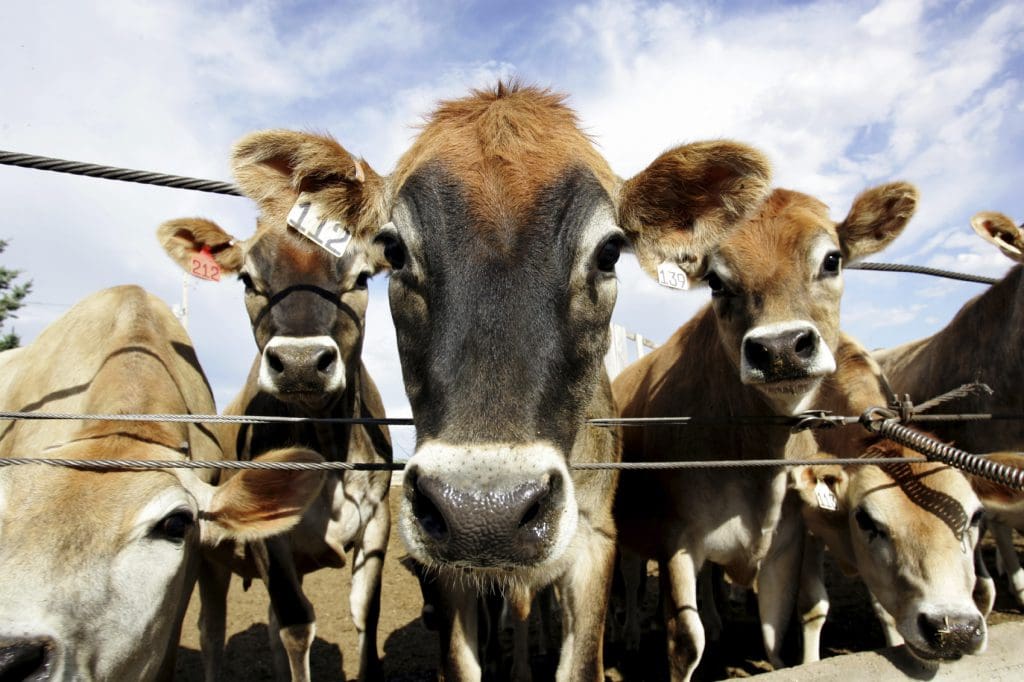

 Meatless Monday in Vancouver just got an important boost! The influential Vancouver Food Policy Council (VFPC) has unanimously passed a motion that “endorses the concept of Meatless Mondays and encourages Vancouver citizens to choose plant-based meals on Mondays.”
Meatless Monday in Vancouver just got an important boost! The influential Vancouver Food Policy Council (VFPC) has unanimously passed a motion that “endorses the concept of Meatless Mondays and encourages Vancouver citizens to choose plant-based meals on Mondays.”

